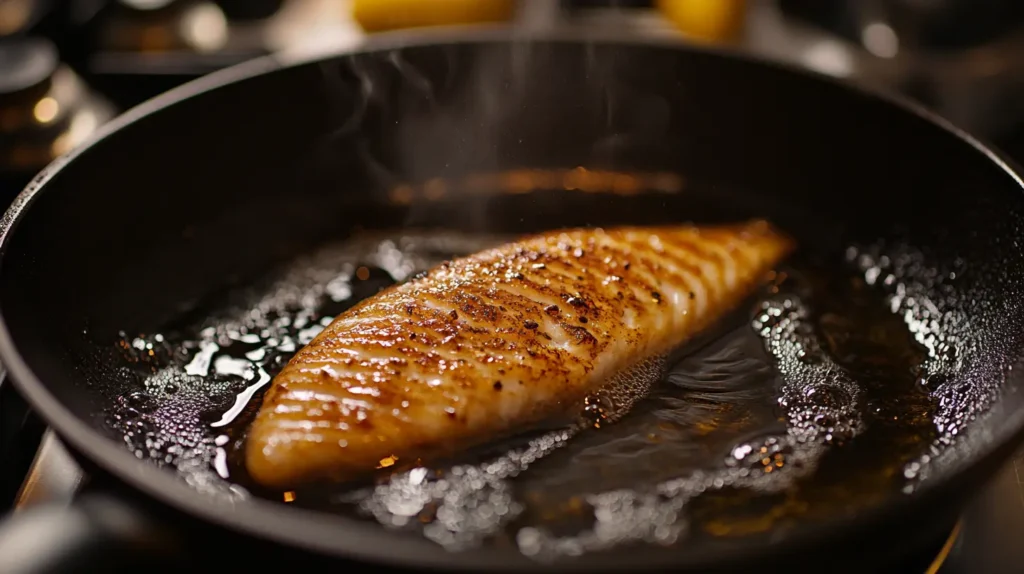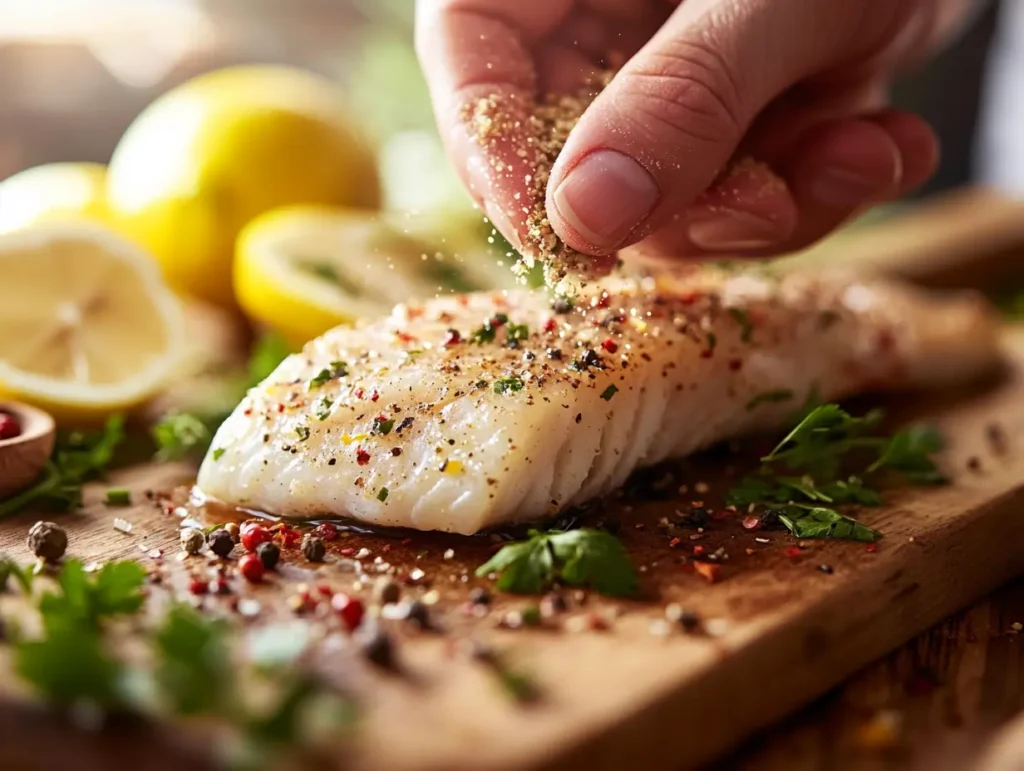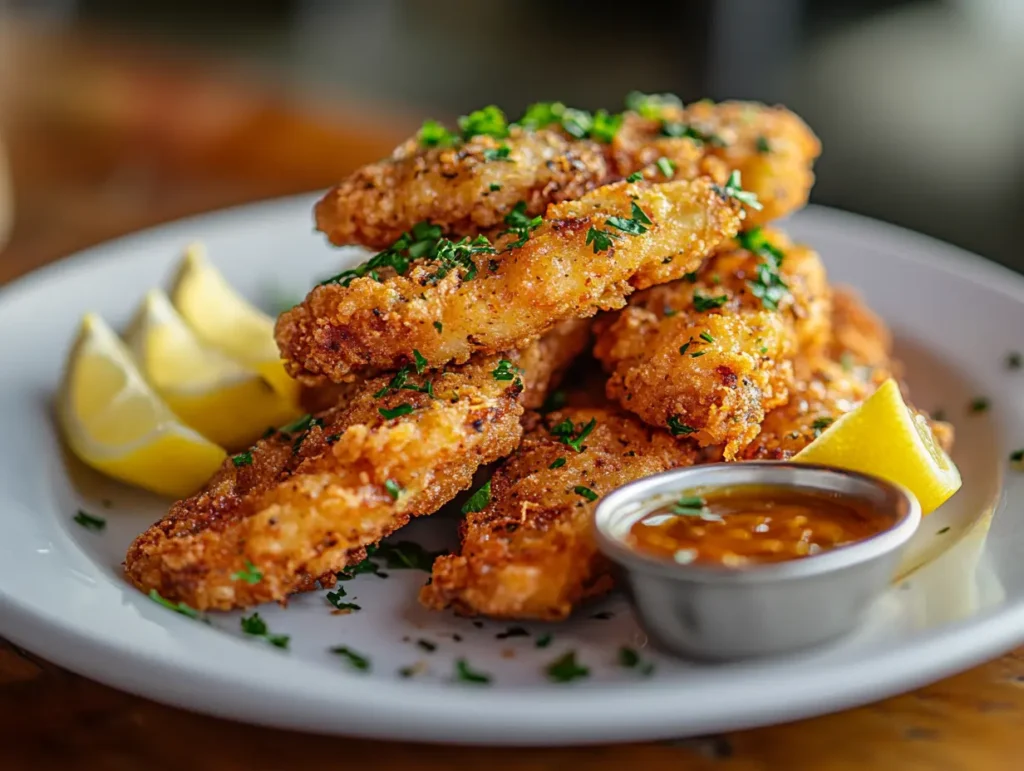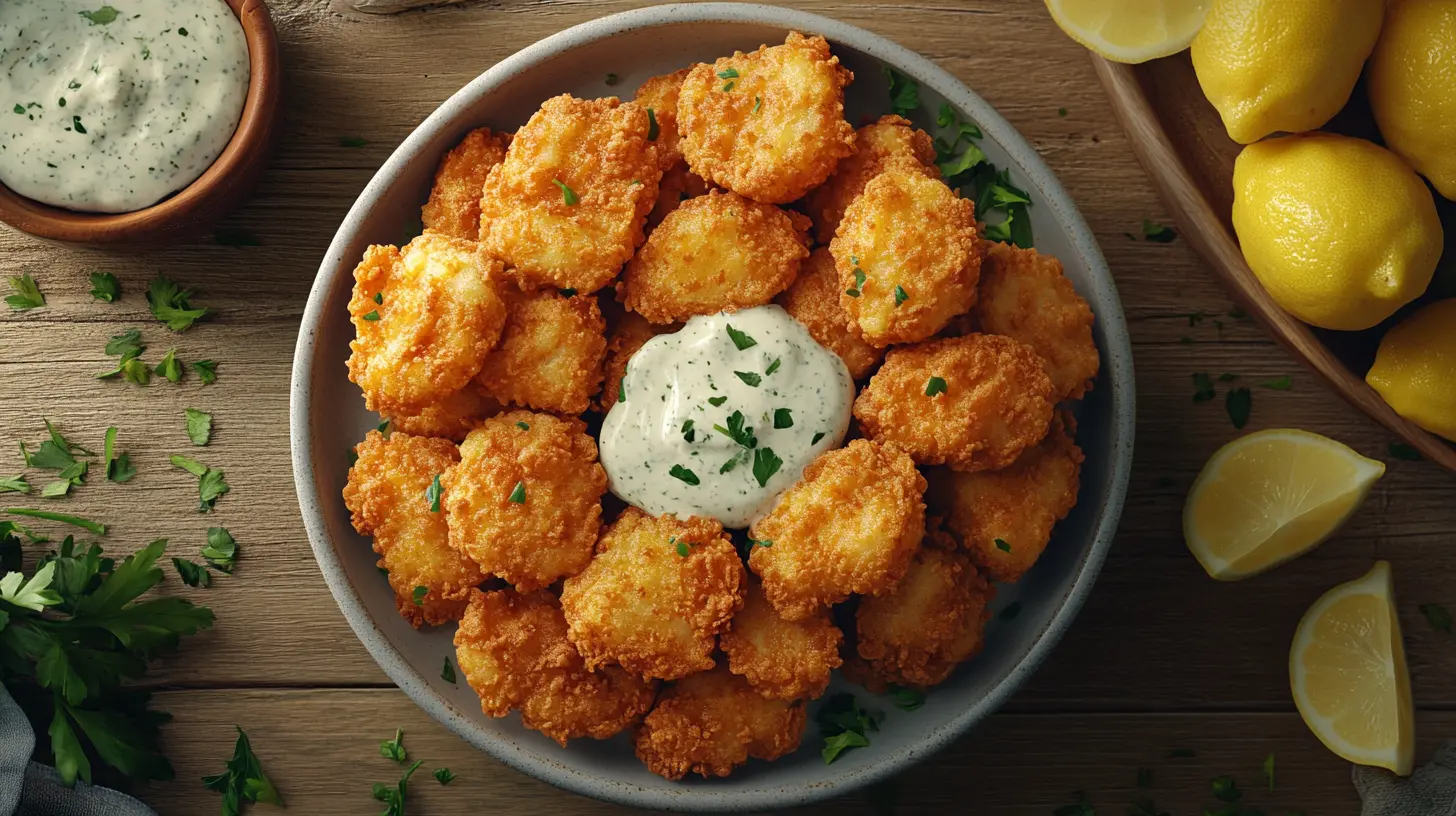Deep frying fish can turn an ordinary meal into a crispy, flavorful delight. But here’s the million-dollar question: Should you season fish before deep frying? If you’ve ever wondered whether seasoning enhances the taste or ruins the texture, you’re not alone. Let’s dive into the world of seasoning and frying to uncover the secrets of a perfect fish fry.
For those who enjoy experimenting with flavors, check out How to Season Louisiana Fish Fry to discover bold and spicy seasoning options.
Seasoning Fish Before Frying
When it comes to cooking, seasoning is like the magic wand that transforms bland ingredients into an orchestra of flavors. But does this apply to fish when deep frying? The short answer is yes, but it’s not as simple as sprinkling salt and tossing it into hot oil. There’s an art to seasoning fish correctly, and when done right, it can elevate your dish to a whole new level.
“Cooking is all about balance, and seasoning plays a vital role in achieving that harmony in your dishes.”
Importance of Seasoning in Cooking
Imagine eating a dish with no seasoning—boring, right? Seasoning doesn’t just add flavor; it enhances the natural taste of the ingredients. When it comes to fish, seasoning can help bring out its mild and delicate flavors while complementing the crispy texture of deep frying.
Want to know the Best Seasoning for Fish? Explore this guide to find the perfect spice blend for your next fish fry.
Overview of Deep Frying Process
Deep frying involves submerging food in hot oil to cook it evenly and quickly. This method creates a golden, crispy crust while keeping the inside tender and juicy. However, the key to making this process successful lies in preparation, and seasoning is a crucial part of that.
Why Seasoning Matters for Deep Frying Fish

Enhancing Flavor Through Seasoning
Think of seasoning as the superhero of your dish. A well-seasoned fish delivers a punch of flavor that balances the richness of the oil used for frying. Without it, your fish might taste bland, and no amount of tartar sauce can save the day.
Improving Texture with Seasoning
Seasoning isn’t just about flavor—it’s about texture too. Ingredients like flour, cornmeal, or breadcrumbs combined with spices can create a crunchy, golden crust that makes every bite a delight. The right seasoning blend ensures your fish remains crispy on the outside and tender on the inside.
Protecting the Fish from Overcooking
Have you ever noticed how seasoned coatings create a protective layer? This layer acts like a shield, preventing the fish from drying out during frying. It’s like a cozy blanket for your fillet, keeping it juicy and flavorful.
Common Mistakes When Seasoning Fish for Deep Frying
Over-seasoning or Under-seasoning
Too much seasoning can overpower the natural flavor of the fish, while too little can leave it tasting bland. Striking the right balance is essential, and this comes with practice and knowing your spices.
Using the Wrong Type of Seasoning
Not all seasonings work well with fish. Overpowering spices can mask the fish’s delicate taste. Stick to herbs, citrus, and mild spices that complement rather than overshadow the flavor.
For more insights into picking the best seasoning, check out What is the Best Fish Fry Seasoning? to make your next fried fish even better.
Ignoring the Type of Fish
Every fish has a unique flavor profile. A strong-tasting fish like salmon may need less seasoning compared to a milder one like tilapia. Understanding your fish is the first step to mastering seasoning.
Techniques for Seasoning Fish Before Deep Frying

Dry Rubs: A Popular Choice
Dry rubs are a fantastic way to season fish. A mix of salt, pepper, and spices like paprika or garlic powder can be gently massaged onto the fish. This method ensures even seasoning and a flavorful crust.
If you’re looking for authentic Southern-style flavors, don’t miss this Hillbilly Fish Fry Seasonings Recipe that adds a classic touch to your fried fish.
Wet Marinades for Added Moisture
Marinades add both flavor and moisture. Soaking your fish in a mixture of lemon juice, olive oil, and herbs for 15-30 minutes can infuse it with flavors while keeping it moist during frying.
Balancing Salt, Herbs, and Spices
Salt is your best friend—but only when used wisely. Combine it with fresh herbs like dill or parsley and spices like cumin or cayenne for a seasoning blend that’s perfectly balanced.
Nutrition Facts Table for Seasoned Fish
| Nutrient | Amount (Per 100g of Fish) |
|---|---|
| Calories | 250 |
| Protein | 22g |
| Fat | 12g |
| Carbohydrates | 10g |
| Sodium (Salt) | 500mg |
Pro Tip
Always pat your fish dry before seasoning to ensure the spices stick properly. A damp surface can cause uneven seasoning, leaving you with patches of bland fish.
Should You Salt Fish Before Deep Frying?
Salting fish before frying is a hot topic in culinary circles. Some swear by it, while others avoid it altogether. So, what’s the deal? Let’s unravel the science and techniques behind salting fish before deep frying.
Effects of Salting on Fish Texture
Salt does more than just add flavor. It helps firm up the texture of the fish by drawing out excess moisture. This process, called osmosis, creates a firmer fillet that holds together better during frying. Plus, a drier surface means a crispier crust. Win-win, right?
“A pinch of salt can make all the difference between a soggy mess and a crispy masterpiece.”
How Long to Salt Fish Before Cooking
Timing is everything when salting fish. If you salt it too early, the fish can become overly firm or dry. A sweet spot? About 15-20 minutes before frying. This allows the salt to penetrate the flesh and work its magic without overdoing it.
Should You Soak Fish Before Deep Frying?
Another debate revolves around soaking fish before frying. Is it worth the effort? Absolutely! Soaking can enhance flavor and texture, making your fried fish even more delicious.
Benefits of Soaking Fish
Soaking fish in a seasoned liquid not only boosts flavor but also helps eliminate any unwanted fishy odors. It’s like a spa treatment for your fillet—it relaxes and refreshes the fish, preparing it for the hot oil.
Best Soaking Liquids for Fish
Not sure what to soak your fish in? Here are some popular choices:
- Milk: Neutralizes strong fishy odors while tenderizing the fish.
- Buttermilk: Adds a slight tang and helps the coating stick better.
- Lemon Juice: Brightens the flavor of the fish.
- Saltwater Brine: Firms up the texture and seasons the fish from within.
Common Mistakes in Soaking Fish
- Over-soaking: Don’t leave your fish soaking for hours. 20-30 minutes is usually enough.
- Wrong liquid: Avoid overpowering liquids like vinegar, which can change the fish’s flavor drastically.
- Skipping seasoning: Add herbs and spices to the soaking liquid for a flavor boost.
When to Season Fish Before Frying
Timing plays a crucial role in seasoning. Adding spices and herbs at the right moment can make or break your dish.
Right Before Frying
Seasoning the fish right before frying ensures the flavors are fresh and vibrant. A quick sprinkle of salt, pepper, and a spice blend creates a flavorful crust when the fish hits the oil.
During the Frying Process
Seasoning during frying? It’s possible! If you’re using a batter or coating, mix spices into it. This way, the seasoning gets cooked into the crust, delivering an extra punch of flavor.
After Frying: Enhancing Final Flavor
Once your fish is fried to golden perfection, don’t forget a final touch. A sprinkle of sea salt or a squeeze of lemon enhances the flavors and adds a pop of brightness.
“Think of post-frying seasoning as the cherry on top—it’s the final step to make your fish irresistible.”
Common Seasoning Blends for Deep-Fried Fish
If you’re unsure about seasoning combinations, don’t worry. Here are some foolproof blends to try:
Cajun and Creole Seasonings
Packed with bold flavors like paprika, cayenne, and thyme, these blends are perfect for adding a spicy kick to your fish. Pair them with catfish or shrimp for a Southern-style feast.
Lemon Herb Blends
This classic combination of lemon zest, parsley, and dill works beautifully with mild fish like cod or tilapia. It’s light, refreshing, and never fails to impress.
Garlic and Paprika Mixes
Garlic and paprika are a dynamic duo. They add depth and smokiness to the fish, making them ideal for fried salmon or trout.
DIY Seasoning Mix Recipe
Here’s a simple seasoning mix you can make at home:
| Ingredient | Quantity |
|---|---|
| Paprika | 2 tsp |
| Garlic Powder | 1 tsp |
| Onion Powder | 1 tsp |
| Cayenne Pepper | ½ tsp |
| Salt | 1 tsp |
| Black Pepper | 1 tsp |
Pro Tip
Don’t shy away from experimenting with spices. Each fish has its personality—let your seasoning blend complement it!
How to Avoid Overpowering Fish with Seasoning
While seasoning is essential, too much can ruin the dish. Here’s how to strike the perfect balance.
Matching Seasoning with Fish Type
Delicate fish like sole or flounder need mild seasonings to preserve their natural flavor. On the other hand, robust fish like mackerel can handle bolder spices without being overpowered.
Using Mild Seasonings for Delicate Fish
For lighter fish, stick to herbs like parsley, dill, or chives. These won’t overshadow the fish but will enhance its subtle taste.Balancing Spicy and Mild Flavors
Want to add some heat? Combine spicy seasonings like cayenne with mild ones like garlic or lemon. This creates a balanced flavor profile that appeals to everyone.
Frequently Asked Questions
You’ve learned a lot about seasoning fish before deep frying, but there are still some common questions that pop up. Let’s clear up any lingering doubts.
Should Fish Be Seasoned Before Frying?
Yes, absolutely! Seasoning before frying enhances the flavor of the fish and ensures a crispy, golden crust. Whether you’re using a dry rub or a marinade, seasoning adds depth and character to your dish. Just remember to balance your spices so they complement the natural taste of the fish.
Quick Tip: Always pat your fish dry before seasoning to help the spices stick better and create an even crust.
Can You Season Fish Before Deep Frying?
Not only can you, but you should! Seasoning your fish beforehand ensures that every bite is flavorful. A well-seasoned batter or coating locks in the spices and enhances the fish’s natural juices during frying.
Should You Salt Fish Before Deep Frying?
Yes, salting fish before frying is a game-changer. Salt helps firm up the fish’s texture and enhances its flavor. Aim to salt the fish about 15-20 minutes before frying for the best results.
What Is the Best Thing to Soak Fish In Before Frying?
This depends on your flavor preferences! Here are some great options:
- Milk or Buttermilk: Neutralizes fishy odors and tenderizes the fish.
- Lemon Juice: Adds a fresh, zesty flavor.
- Brine: Firms up the texture while subtly seasoning the fish.
- Spiced Marinades: Infuses bold flavors into the fish.
Pro Tip: Always season your soaking liquid with herbs or spices to give the fish an extra layer of flavor.
Conclusion: Should You Season Fish Before Deep Frying?

Seasoning fish before deep frying isn’t just an option—it’s a necessity if you want to create a dish that’s flavorful, crispy, and irresistible. From enhancing the taste to improving the texture, the right seasoning techniques can elevate your fried fish to restaurant-quality levels.
Recap of Benefits of Seasoning
- Flavor Boost: Seasoning complements the natural taste of the fish.
- Texture Improvement: Creates a crispy, golden crust.
- Moisture Retention: Helps keep the fish juicy and tender.
Practical Tips for Perfectly Seasoned Fish
- Know Your Fish: Choose seasonings that complement the fish’s flavor profile.
- Balance Your Spices: Avoid overpowering the fish with too much seasoning.
- Master Timing: Season right before frying or 15-20 minutes beforehand for best results.
- Experiment: Don’t be afraid to try new spice blends and soaking techniques.
Final Thoughts on Achieving Flavorful Deep-Fried Fish
Cooking is all about finding what works for you. Whether you’re a fan of bold Cajun spices or prefer the simplicity of a lemon herb blend, seasoning fish before deep frying is the secret to achieving perfection. So, the next time you’re ready to fry up some fish, remember: seasoning isn’t just an extra step—it’s the heart of the dish. 🐟🔥
Summary Table: Best Practices for Seasoning Fish Before Deep Frying
| Step | Why It’s Important | Pro Tip |
|---|---|---|
| Pat fish dry | Removes excess moisture for even seasoning | Use paper towels for best results |
| Use a dry rub or marinade | Adds flavor and enhances texture | Massage rubs gently for better adhesion |
| Salt 15-20 minutes prior | Firms up texture and boosts flavor | Avoid oversalting to prevent dryness |
| Experiment with blends | Keeps your dishes exciting and unique | Start with simple blends and adjust |
Now it’s your turn! Grab your favorite seasonings, choose your fish, and let your culinary creativity shine. Deep frying is an art, and with the right techniques, you’ll be serving up crispy, flavorful perfection in no time. 🎣🍽️

Seasoned Deep-Fried Fish
Ingredients
Method
- Pat the fish dry with paper towels to remove excess moisture.
- Soak the fish in buttermilk or lemon juice for 15-30 minutes.
- Mix seasoning ingredients together in a bowl.
- After soaking, remove the fish and coat it evenly with the seasoning.
- Heat oil in a deep fryer or heavy skillet over medium-high heat.
- Carefully add the seasoned fish to the hot oil, avoiding overcrowding.
- Fry the fish until golden brown and crispy, about 4-5 minutes per side.
- Remove the fish and drain on a paper towel to absorb excess oil.
- Serve hot with a sprinkle of sea salt and a squeeze of lemon.
